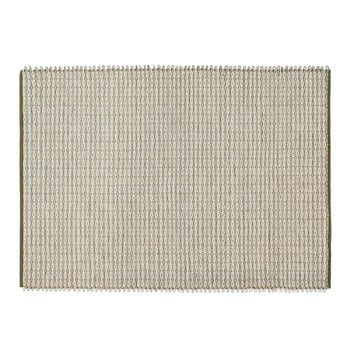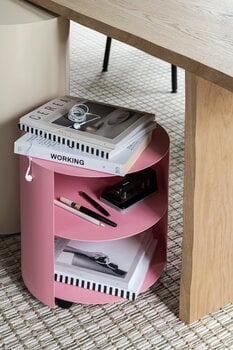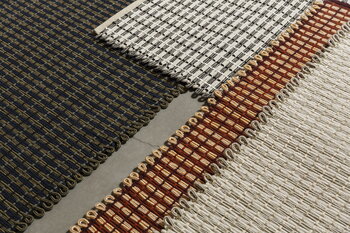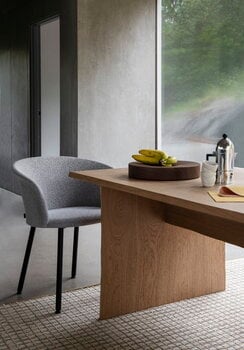Hem’s Rope rug captivates with its detailed expression. Designer Pauline Deltour was inspired by the functionality and tactility of traditional Japanese tatami rugs and created a modern, equally unique version. Hand-woven from a thick cotton rope, the Rope rug is as durable as it is beautiful. An effortless fit for all styles and spaces, the medium Rope rug looks phenomenal for example in the living room or dining area.
Rope rug, 170 x 240 cm, Seaweed
Hem
Description
Hem’s Rope rug captivates with its detailed expression. Designer Pauline Deltour was inspired by the functionality and tactility of traditional Japanese tatami rugs and created a modern, equally unique version. Hand-woven from a thick cotton rope, the Rope rug is as durable as it is beautiful. An effortless fit for all styles and spaces, the medium Rope rug looks phenomenal for example in the living room or dining area.
Product details (6)
- Material
- 95% cotton, 5% polyester
- Colour
- Grey green, light grey, beige
- Length
- 240 cm
- Width
- 170 cm
- Weight
- 13.9 kg
- Care instructions
- Vacuum your rug using a low-powered vacuum cleaner. Avoid using hard roller brush. Shedding of loose fibers will occur with new rugs. Occasional dry cleaning from professional rug-cleaning company is recommended. Avoid direct and continuous exposure to sunlight and rotate rug periodically to promote even wear. Use of a rug pad is highly recommended.
- Product ID
Designer
Pauline Deltour (1983 - 2021) was a French designer, whose delicate yet powerful design identity has been recognized worldwide. Skilfully balancing between art and design, Deltour opened her own studio in Paris in 2011 and has since created both individual objects and complete concepts, alongside interior architecture. Deltour has left her seductive, poetic imprint on the collections of many international design brands such as Alessi, Hem and Tolix, to name just a few.
View all productsReviews (0)
Sustainability
The Product Sustainability Framework, our criteria of sustainable design, helps you find the most sustainable products in our selection. Read below which sustainability criteria this product has met.
Working conditions & labour 8/9
-
Equal opportunities for all employees
-
Commitment to UN Global Compact, fair compensation for all employees
-
Corporate responsibility requirements defined and communicated for suppliers
-
Systematic work for improved inclusion and well-being in the workplace
-
Transparent supply chain
-
Suppliers' compliance to a code of conduct ensured
-
Compliance to the UN Guiding Principles on Business and Human Rights ensured in the supply chain
-
Support for community involvement in the supply chain
-
Direct suppliers audited and certified
Eco-friendly production 8/9
-
Fair and resource-wise water-use in production
-
No incineration or landfilling of returned items
-
No use of endangered species as materials
-
No direct environmental emissions or waste (excl. GHGs) from production
-
The sustainability of direct suppliers' production is addressed and monitored
-
Production and material sourcing that respect biodiversity, animal rights, and natural ecosystems
-
Material-efficient and ecological packaging
-
No potentially harmful chemicals used in own production
-
Positive impact on nature’s well-being through operations that regenerate natural ecosystems
Climate impact 4/8
-
Company's direct greenhouse gas emissions identified and commitment to reduction
-
Product's carbon impact identified and commitment to reduction
-
Guidance on energy- and eco-efficient use of the product
-
100 % renewable energy in own production and operations
-
Contribution to climate initiatives beyond the brand’s direct operations
-
Low-carbon or compensated transportation
-
Carbon footprint of the product calculated and goals set to reduce it
-
Carbon neutral or carbon negative product
Sustainable materials 5/6
-
Sustainable and long-lasting material choices
-
No harmful or hazardous substances
-
Responsible raw material sourcing and production
-
Materials suited for circularity: monomaterials, recyclable finishings, renewable or recycled contents etc.
-
Ecological materials: natural, biodegradable, recyclable or recycled contents
-
Outstanding materials in terms of innovativeness, responsibility, sustainability and circularity: local production or sourcing, 100 % recycled content, C2C-certification etc.
Circular design 3/5
-
High aesthetic quality promoting long-term use of the product
-
Technically durable product design and material choices
-
Design for enduring life-long quality
-
Design and support for product maintenance, repair and upgradability
-
Innovative circular design solutions: circular service system, resale platform, remanufacturing, collection of used products, etc.











